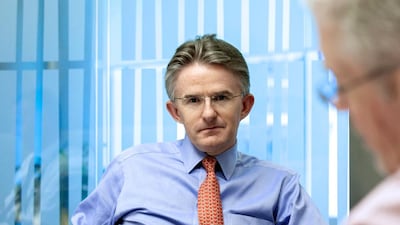John Flint, the global head of retail banking and wealth management at HSBC, sums it up in a pithy phrase: "HSBC does not go home".
He is talking about the commitment of the bank to the UAE, and though he does not say it specifically, he paints it in stark contrast to other British-based banks that have scaled back their retail presence in the UAE, or pulled out altogether.
The phrase also hints at the support HSBC gave to Dubai during the financial crisis, when it was one of the emirate’s biggest creditors. “Now, we are back on a growth agenda. The great thing is that the region is growing, and the macro-environment has clearly improved,” he says.
Not that “going home” was ever really an option for HSBC in the region. The bank has been here for decades, via its ownership of the old British Bank of the Middle East, for which Mr Flint worked early on his career with HSBC.
He has other links with the region too. His father was a teacher in Saudi Arabia, and he remembers weekend camping trips at Jebel Ali long before it became the biggest port in the Middle East. After that, he had another posting to Bahrain when it was the financial hub of the region. So he feels at home in the UAE.
Several things brought him back to the region this week. “It’s one of the geographies for which I’m responsible, so I come to see what the current issues are and to pay my respects to the regulators,” he says.
So what are the current issues in UAE banking? Mr Flint’s duties for the bank are global, so he prefers to start with an issue that has become an important part of the bank’s international strategy, with big implications for the region. “The way we pay people, how we incentivise them, is important and is impacting the business and the customers.”
Since the crisis, all banks have come under pressure, from regulators and from customers, to return to their roots as businesses that deal primarily with customers. “There was perhaps too much ‘retailisation’, where branches were seen as shops through which we sold products to customers. Now we need to be more customer-centric. In the new world, we will only seek to sell you products that meet your needs,” he explains.
The shift in emphasis has involved introducing a new remuneration system for HSBC, with quarterly assessment of employees’ pay. The first part of the new cycle is complete next month, so the results can be tested then. “The intention is not to reduce employees’ pay, but to assess them on a different basis,” he says.
Employees in HSBC’s wealth management business have already been through the cycle, with positive results. There is talk of increasing the headcount in wealth management.
While this is an issue facing HSBC on a global scale, he also recognises there are specifics that make the UAE a unique market. Neither he, nor Andy Ripley, the head of retail banking in the UAE, believes that the restrictions imposed by government on foreign branches is that significant.
HSBC can only have eight branches, far fewer than their local rivals, but with the growth of customer service units in malls and internet and mobile banking, Mr Flint does not see that as such a problem.
There is also a perception that the UAE is an expensive place to do banking, from a business point of view, but the cost-income figures compare well with other regions of the world, he says. “The retail business relies on scale, and the average value of customers in the UAE is higher than most other parts of the world,” he adds.
Emiratisation, seen by some bankers as an extra cost of doing business in the UAE, is “an opportunity. I’ve been impressed by the calibre of local staff at all levels in the UAE”, he says.
On the criminalisation of customers who find themselves in financial difficulties, Mr Flint sticks to the house line: “It’s market practice in this part of the world, and we adhere to that. We always first aim to support customers in financial distress through our specialised remedial units.”
He and Mr Ripley believe that the criminalisation issue will be largely addressed when the UAE’s credit bureau is up and running, and do not foresee the problems some bankers have forecast in the initial stages of the credit-checking operations.
“We’ve been working very closely with the bureau already, and don’t think there will be a ‘big bang’ and don’t think there will be any major disruption, perhaps some initial teething problems. We’ve introduced direct debits and there was no chaos,” he says.
Despite its London base, HSBC is increasingly a bank focusing on emerging markets. “Our strategy recognises that they will continue to outperform growth in the developed world. We believed it before the crisis, and now even more so after,” he says. However, the issue of moving headquarters out of London, as has been speculated, “is a non-issue at this point of time”.
London will continue as HSBC global HQ for the foreseeable future, but Mr Flint does recognise the UAE’s attractions. “Dubai is also a convenient time-zone, and is a great travel hub for Asia,” he says.
fkane@thenational.ae
Follow us on Twitter @Ind_Insights

